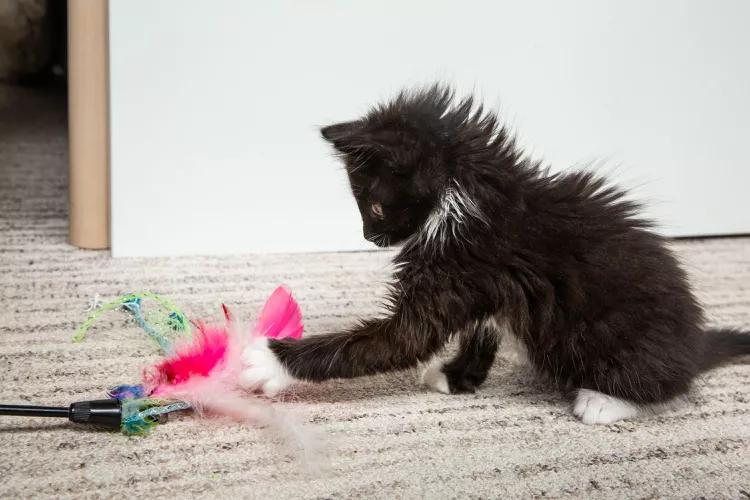
Kittens go through a lot of changes very soon after they're born. The first few weeks of their lives are full of new sights and sounds, and by the time they reach six weeks of age, they are almost ready to leave their mothers. But that doesn't mean the growing, changing, and learning comes to a halt. Between the ages of six and 12 weeks of age, there are still several big milestones that a kitten needs to pass.
Between six and 12 weeks of age, a kitten is very active and social. It won't sleep quite as much as it did as a newborn, but it will still spend more than half the day napping. A kitten will start playing with its littermates, explore its surroundings, and its personality will start to develop. This time is extremely important for developing your kitten's social skills. If a kitten doesn't have the opportunities to learn right from wrong through playing and discipline from its mother and littermates, then it may have difficulty as an adult. Social skills may suffer in kittens who were not properly socialized or they could even develop aggression issues.
A six-week-old kitten should be in the weaning process to transition away from nursing. High-quality, canned kitten food should be mixed with water to create a gruel until the kitten can eat the canned food without the added water. Then the kitten will advance to dry kitten kibble once it is comfortable eating canned food and it has its baby teeth. By eight to 10 weeks of age, a kitten should be fully weaned from its mother. There is no need to limit the amount of food a kitten consumes at this age.

Is Neosporin Safe for Cats?
A brief summary of concerns a cat owner should be aware of before putting Neosporin on their cat, plus tips for things they can use at home instead.
18 Warning Signs That Your Cat Is Crying for Help
How can you tell if your cat is sick? Learn about the warning signs indicating your cat is crying for help and find out what to do about them.
Chlamydia in Cats
Chlamydia in cats is a bacterial infection primarily affecting the eyes, which can cause conjunctivitis. Learn the causes, treatment, and prevention.
Why Does My Kitten Bite Me? How to Stop Biting and Scratching in Kittens
Why does your kitten bite you? Play aggression is often the cause, but there may be other reasons for the scratching and biting. Here’s what to do if your cat bites and scratches you, including how to stop it.
200 Tortoiseshell Cat Names for Your Bi-Colored Kitty
Tortoiseshell cats are a rare phenomenon and deserve a fitting name. We've pulled together 200 tortoiseshell cat names, including male names, female names, cute names, and names inspired by their coat color and pattern.
12 Fluffy Cat Breeds Perfect for Endless Cuddles
If you like long-haired cats and don't mind daily (or almost daily) brushing, you’ll love these fluffy cat breeds.
10 Unique Bobtail Cat Breeds
Bobtail cat breeds, including the Manx and Cymric, result from natural genetic mutations. Learn whether one of these cats is right for you.
Burmese: Cat Breed Profile, Characteristics & Care
Known for their loving personality and muscular body, the Burmese loves to cuddle after a bout of kittenish playing. Learn about the Burmese breed.
Turkish Angora: Cat Breed Profile, Characteristics & Care
The elegant and silky Turkish Angora cat is a playful, affectionate, and sometimes mischievous pet. Learn about the Turkish Angora breed.
Why Does My Cat Follow Me Around Everywhere?
Cats can follow their owners around for a few different reasons. Find out what your cat is trying to tell you if they follow you around.
Why Does My Cat Bite My Chin?
If your cat is biting your chin, this might be a sign of affection, but it can also be caused by boredom or stress. Learn how to curb the behavior.
Common Causes of Mucus in Dog Poop
Seeing mucus in your dog's poop can be concerning to a dog owner. Here are common causes and treatment of mucus in a dog's stool.
Why Do Dogs Pant?
Dogs pant for a number of reasons, including cooling, excitement, and play. But sometimes panting is a sign of a physical problem. Learn why dogs pant and what to do about it. Here’s how to tell if your dog’s panting is normal or a sign of a problem.
Intervertebral Disc Disease (IVDD) in Dogs
Intervertebral disc disease (IVDD), or a herniated disc, is a serious condition of the spinal cord. Learn the causes, treatment, and prevention.
Can Dogs Eat Watermelon?
Can dogs eat watermelon? Yes! But its important to keep certain precautions in mind. Learn the benefits, risks, and how to safely feed your dog this fruit.
Border Collie: Dog Breed Characteristics & Care
Learn about the border collie, a popular herding breed. They're a smart and energetic dog that's also a great companion to the right pet parent.
Beagle: Dog Breed Characteristics & Care
Learn about the beagle, one of the most popular dog breeds in the world. They are known for being a cheerful, comical, loud, and energetic family dog.
Bluetick Coonhound: Dog Breed Characteristics & Care
Bluetick Coonhounds are a medium-size hound that are gentle and affectionate. They are commonly used as a raccoon hunting dog.
Tibetan Terrier: Dog Breed Characteristics & Care
The Tibetan terrier is a happy-go-lucky dog with a shaggy coat. Learn more about the history, care tips, and other helpful information about the breed.
Lagotto Romagnolo: Dog Breed Characteristics & Care
The Lagotto Romagnolo is an intelligent working breed from Northern Italy and can be an adaptable and laid back companion breed.